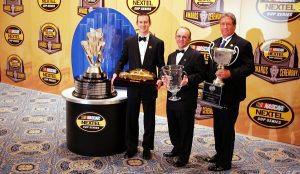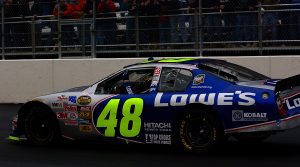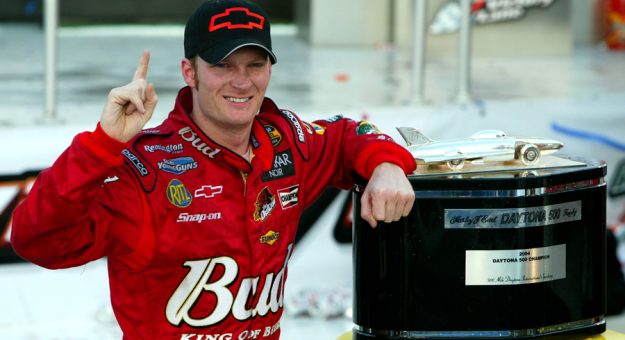Editor’s Note: NASCAR is celebrating its 75th anniversary. SPEED SPORT was founded in 1934 and was already on its way to becoming America’s Motorsports Authority when NASCAR was formed. As a result, we will bring you Part 57 of a 75-part series on the history NASCAR.
It should come as no surprise that in an era where poker on television draws high ratings, NASCAR officials would turn the battle for the first Nextel Cup championship into a billiard game.
In an effort to boost television ratings against NFL football in the fall, NASCAR created a 10-race playoff system known as the Chase for the Championship. It locked in the top 10 drivers after the 26th race, resetting the points between each driver into five-point increments for the first event in the Chase — the fall race at New Hampshire Motor Speedway.
Kurt Busch immediately capitalized with a victory at NHIS, which vaulted him from seventh to a first-place tie with Dale Earnhardt Jr., who was awarded the position because he had more victories in the season than Busch.
Busch used consistency in the final nine races to give team-owner Jack Roush his second-straight title. Busch finished in the top 10 in nine of the final 10 races.

The Chase saw five drivers enter the final race mathematically eligible to win the title, and NASCAR got its wish when the contrived playoff format produced the closest finish in series history.
Busch defeated Jimmie Johnson by eight points and Gordon by 16. Under the old points format that was used from 1975-2003, Gordon would have become the sport’s third five-time champion.
But as it was, Busch had to endure adversity during the season finale at Homestead-Miami Speedway to win the championship.
On lap 92, Busch was running second when the hub on his right-front wheel sheered away on his Ford Taurus. He was entering the pits because of the vibration and the wheel came off as he entered pit lane.
With the wheel rolling down the frontstretch, the yellow flag waved, keeping Busch from losing a lap, but he dropped to 28th place. He fought back to finish fifth.
“I was in stitches,” Busch admitted. “I was just sick to my stomach the last few laps. I had been out there forever. I hadn’t had fresh water in a while. This championship that NASCAR put together with this new format, it took so much from within. I felt like I had the whole world on my shoulders every lap today.
“So many emotions today and to be able to pull through and finish like we did to cap off a great season. It’s just an unbelievable feeling.”
Busch certainly wasn’t the most popular pick of the 10 drivers in the Chase. He isn’t very popular among the fans, many of the drivers have had run-ins with the aggressive driver and his penchant for using big words without knowing their true meanings left many in the media scratching their heads trying to figure out what he meant.
“Say, what?” could have been Busch’s battle cry.
But, he did what he had to do to hoist the first Nextel Cup, which really isn’t a Cup at all but a series flag in a sculpture. The title was worth at least $5 million to the driver from Las Vegas, and NASCAR got want it wanted in terms of increased television ratings.
The Homestead finale drew a 5.6 overnight rating on NBC — the highest rating for the Homestead race in its six-year history. It couldn’t have come at a better time for NASCAR as it begins negotiations for a new television contract.
“We are thrilled with the continued success of NASCAR on NBC and TNT,” said Ken Schanzer, president, NBC Sports. “When the top four drivers were separated by just nine points with 72 laps to go, it proved positively the wisdom of the Chase.
“In that moment the sport’s burgeoning popularity coupled with the innovative season ending Chase and ISC’s investment to create a track worthy of hosting a true championship event, all combined to create exceptional drama.”
Although it provided artificial drama, the new system once again did not reward the driver with the most victories.
Johnson won eight races, including four victories during The Chase. He fell just short of capturing his first title, which would have given Hendrick Motorsports a chance to remember 10 team associates who were killed in a private plane crash near Martinsville, Va., on Oct. 24.
The deaths had a near-devastating impact on one of the best teams in the series.
The fatalities included team president John Hendrick, brother to team owner Rick Hendrick. John’s 22-year-old twin daughters Kimberly and Jennifer were among those who died. So was Rick’s 24-year-old son and heir apparent to owning the team, Ricky.
Also killed were Randy Dorton, the head of Hendrick Motorsports engine department; Joe Jackson, a vice president at DuPont; Jeff Turner, general manager at Hendrick Motorsports; Scott Lathram, a helicopter pilot for Tony Stewart; and pilots Richard Tracy and Elizabeth Morrison.
The four Nextel Cup drivers at Hendrick Motorsports — Gordon, Johnson, Terry Labonte and Brian Vickers, along with Busch Series driver Kyle Busch, drove with heavy hearts but fierce determination at the end of the season.

But it wasn’t enough to keep Busch from the championship.
“I’m very disappointed,” Gordon said of not giving Hendrick the title. “I think that it put a whole different meaning on the championship for us. We wanted it for Hendrick Motorsports. We knew Rick (Hendrick) was here.
“We knew it was an emotional weekend for him coming back. We knew how much it would mean for us to stand up on that stage in New York and honor those guys as champions, Jimmie or myself, whichever one could get it done.
“It’s a disappointment no matter what, knowing that we had an opportunity to do something really special like that. It made it that much more meaningful, but it also makes it that much more disappointing.”
Both Gordon and Johnson are realists when it comes to the demands that are placed on them.
“We did everything we could possibly do,” Johnson said. “When you go to bed at night knowing that, you sleep a lot easier. The other thing is it’s meant to be. It wasn’t in the cards for us this year.”
The frantic finish to Nextel’s first season as series sponsor will long be remembered for bringing in a new era to NASCAR. While some in the sport resist change, it’s obvious NASCAR CEO Brian France is not one of them.
He continues to lead the sport forward, pushing tradition aside and doing what he believes is best.
While some may question some of his decisions, France was not afraid to chart a new course for NASCAR under his leadership, just as his father did in 1972.
